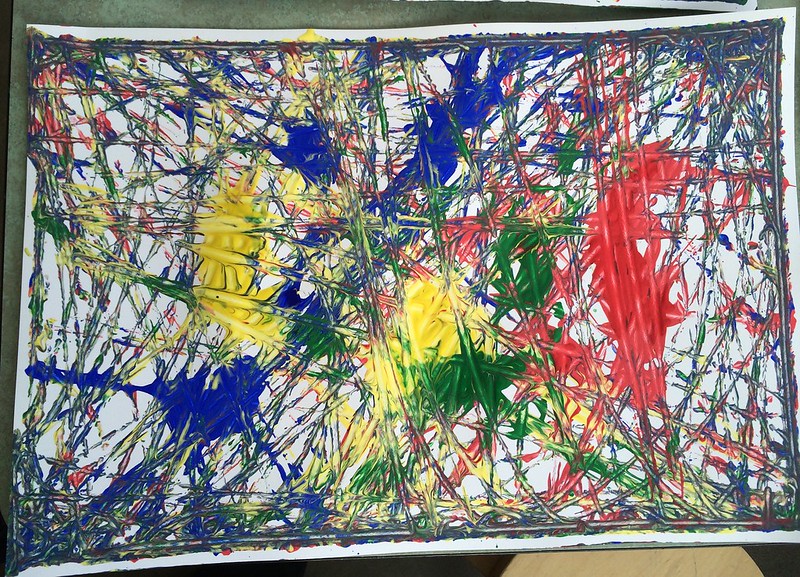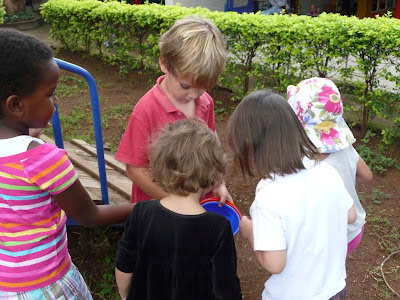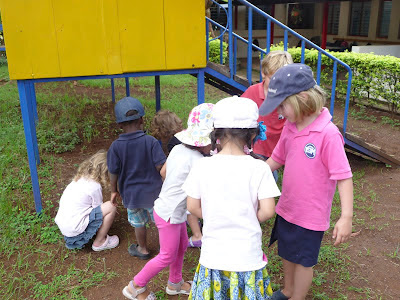Showing posts with label counting. Show all posts
Showing posts with label counting. Show all posts
August 12, 2015
Counting to 100 Marble Art
This is a great art project by itself or to practice counting. Also good for the 100 days of school.
See the whole post on this link.
April 11, 2012
Accidental Counting
Letting the students’ interests guide their learning
experiences is one of the best ways for them to learn. Here is an example.
Today during recess there were many millipedes walking around
the playground. The children were fascinated by them.
One of the boys got a bucket from the sand pit and began collecting them. Soon enough lots of children joined in.
Young Ones.
Young Ones.
Older ones
“How many?” one child asked
“Toooooo many” the boy said
“So let’s get more”, another added.
The constant movement of the millipedes in the bucket was
fascinating.
“Can I take them home?” the boy with the bucket asked.
“Sure” I said, “but you have to ask your mother if it is ok.
Maybe we can do something with them after recess?”
“We can count them!” someone said.
Counting interesting things is a favorite activity in EC.
We passed the jar around and guessed how many millipedes
were there.
I asked how we could count them. They said, “One by one”.
We decided to place them in a tray and the boy who started
collecting them volunteered to get them one by one and place in the bucket as
we counted.
When we got to 45 I thought the children would loose
interest but they kept their focus the whole time.
Guess how many? One Hundred and Four Millipedes! A number quite abstract for early childhood students, but they loved it. Well, they know one hundred is a lot!
The millipedes are now back in the garden. By dismissal time the boy did not want to
take them home anymore. I think his mother was quite happy about that.
February 20, 2012
Butterfly Number Sense
Recently I discover pieces of an old
bulletin border with butterflies and they looked beautiful and so real that I had the idea to
cut out the butterflies and glue them on skewers to work with number sense.
First I observed if the
students liked the butterflies and they surely did.
Here are some of the ways I
used to work with number sense.
Count the butterflies:
How many are you holding?
How many are on the table?
How many are on the leaf?
How many are flying?
Number knowledge - Compare
quantities:
You hold these and you hold
these.
How many do you have? and you?
Who has the larger number of
butterflies?
Who has the least amount of
butterflies?
Story problems with
object reference:
Two butterflies were flying
then one joined in. How many are flying altogether?
Four butterflies were flying
then one decided to fly away. How many are flying now?
Non-verbal calculation
I make two butterflies fly
and hide behind a chair but do not say anything. Then make one more fly and
hide behind the chair. Then ask: How many butterflies were flying? or are
hiding?
This was the students
favorite activity. They were so quiet and paying close attention to how many
butterflies were disappearing behind the chair.
Addition and subtraction
with no object reference:
How much is one plus one? Two
minus one?
I do the problems according
to the students’ level of ability.
The students were also invited to create their own story problems.
The students were also invited to create their own story problems.
It is essential for
preschoolers to explore NUMBER SENSE in different ways. You need to make it fun
and use different strategies like the ones I mentioned above as well as many
others.
Find something they like.
You can use the students themselves.
The bottom line is that working
with number sense continuously expands your students’ Math abilities and they
will carry this on to the next grade levels.
Amelia Mello, M. Ed.
Amelia Mello, M. Ed.
Subscribe to:
Posts (Atom)

















